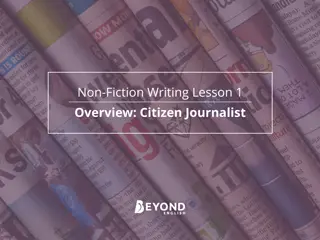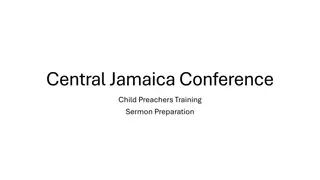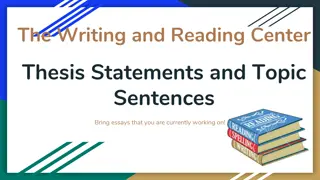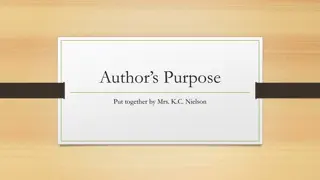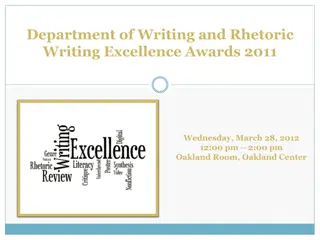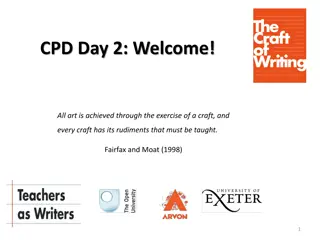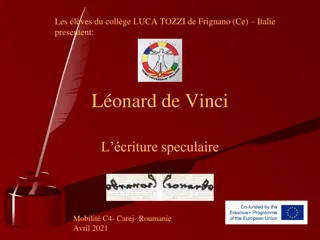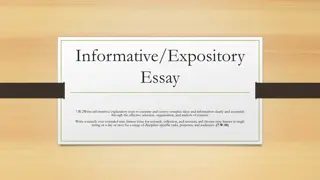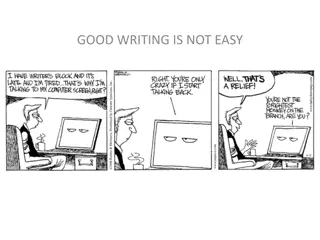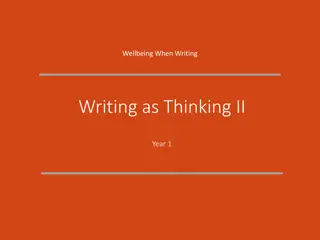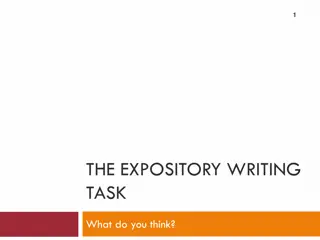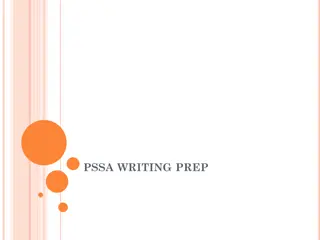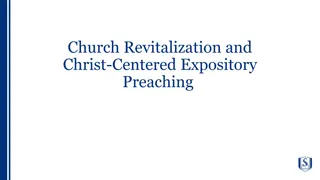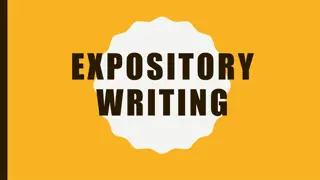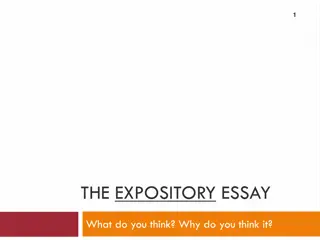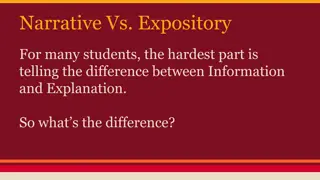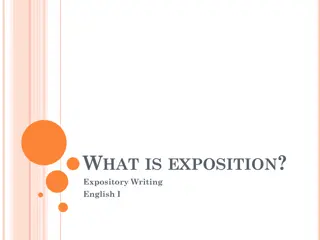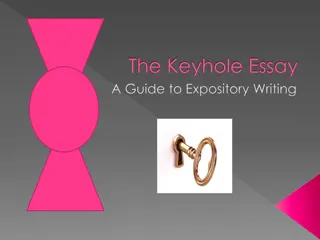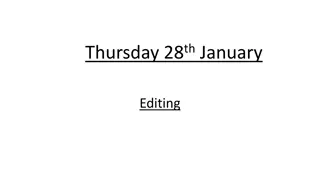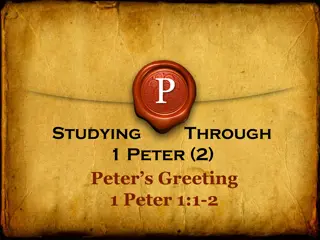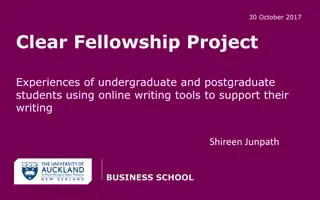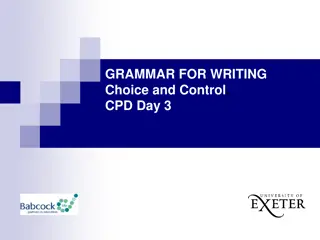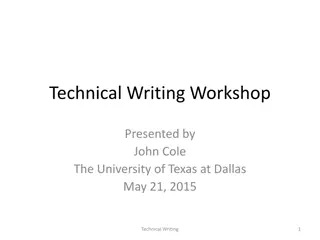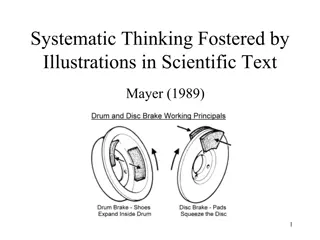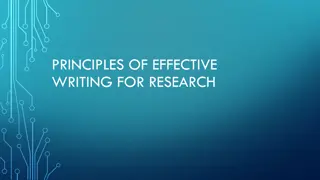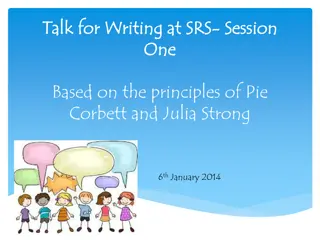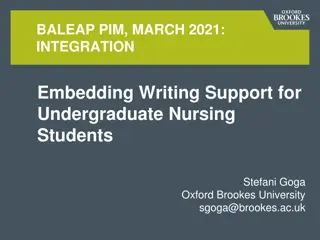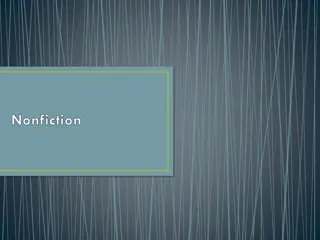Citizen Journalism and Non-Fiction Writing
Explore the world of citizen journalism and non-fiction writing, learning about text types, adapting writing to conventions, considering audience, purpose, and tone. Discover the significance and usefulness of non-fiction writing, and delve into creating various text types. Uncover the role of citiz
2 views • 11 slides
Comprehensive Overview of English Writing Course
This comprehensive English writing course, led by lecturer Muhammad Muslim Nasution, covers various aspects such as grammar, vocabulary, writing styles, and assessments. Students are required to actively participate, submit assignments, attend classes regularly, and produce writing projects. The cou
2 views • 8 slides
Sermons: Types, Preparation, and Structure
Explore the significance of sermon preparation, types of sermons (expository, topical, narrative), key sermon components, and essential tips for sermon preparation.
1 views • 12 slides
Mastering Thesis Statements for Effective Essays
Understand the essence of a thesis statement - the core of your essay. Learn to craft thesis statements based on the type of paper you are writing - analytical, expository, or argumentative. Explore examples and essential questions to refine your thesis effectively.
1 views • 12 slides
Unleashing Creativity Through Writing
Explore the essence of creative writing as a means to express thoughts, emotions, and opinions. Delve into the various forms, techniques, and genres of creative writing, from poetry and plays to expository and persuasive writing. Embrace the freedom and power of literary devices to craft compelling
1 views • 23 slides
Mastering Academic Writing: Strategies for Success
Academic writing is a formal style of writing with specific characteristics such as accuracy, brevity, and clarity. Understanding academic style is crucial for success in your course as it reflects your engagement with the content. Successful academic writers read, learn new vocabulary, and have a s
0 views • 23 slides
Challenges and Perspectives in Academic Writing for English Learners: Insights from Yemeni Students and Educators
Exploring the challenges and experiences of MA English students in academic writing, the narrative reveals issues faced by learners in Yemen such as outdated curricula, lack of teaching aids, and struggles with writing skills. Insights from a teacher highlight improvements in syllabi yet continued c
0 views • 14 slides
Academic Writing Essentials: Background, Types, and Formats
Explore the essential aspects of academic writing in this comprehensive guide. Learn about the purpose of academic writing, common types such as projects and essays, and the formats for short and long writing tasks. Discover the features of academic writing like accuracy, objectivity, and formal sty
7 views • 46 slides
Graduate-Level Writing in Academic Communication
Explore the nuances of academic writing at the graduate level in the School of Communication with Francesca Gacho, a Graduate Writing Coach. Learn about the features, characteristics, and strategies necessary for various genres of writing in this context. Discover the expectations and conventions of
2 views • 30 slides
Author's Purpose in Writing
Explore the various purposes authors have when writing, such as entertaining, informing, persuading, or satirizing. Learn how the choice of writing style reflects the author's intent, whether through narrative, descriptive, persuasive, or expository writing. Discover clues in titles, prefaces, and t
1 views • 37 slides
Creative Teaching Approaches for Persuasive Writing Workshop
The workshop focuses on using Grammar for Writing principles to enhance teaching of persuasive writing, emphasizing modal verbs and adverbials. It encourages creative writing by engaging young writers' imaginations and beliefs, allowing freedom to explore ideas. Participants learn key teaching princ
0 views • 51 slides
Department of Writing and Rhetoric Writing Excellence Awards 2011
The Department of Writing and Rhetoric at Oakland University organized the Writing Excellence Awards in 2011, recognizing outstanding submissions across various categories including writing from/about sources, original research, visual and/or auditory composition, fiction, and creative nonfiction. T
2 views • 42 slides
Comprehensive Guide to Kindergarten Writing Training for NYSESLAT 2019
Explore a detailed guide on Kindergarten Writing Training for the NYSESLAT 2019 exam. The training covers four constructed-response types including Letter Writing, Word Writing, Sentence Writing, and Writing a Story. Gain insights into the application of holistic writing rubrics, analyzing student r
1 views • 24 slides
Craft of Writing Framework for Teaching Writing
Explore the Craft of Writing Framework to enhance your teaching of writing skills, transforming your Arvon residential experiences into effective classroom strategies. Embrace language choices, text-level decisions, authorship, writing processes, and reader-writer relationships to empower students i
0 views • 39 slides
Enhancing Postgraduate Academic Writing: Feedback Collaboration Model
Developing a collaborative model for postgraduate academic writing courses involves understanding the role of feedback, focusing on content feedback, and exploring the intersections between discipline specialist and writing tutor feedback to improve academic writing abilities. Feedback offers valuab
2 views • 27 slides
Leonardo da Vinci and His Mirror Writing
The students of Luca Tozzi College in Frignano, Italy, explore Leonardo da Vinci's specular writing, a unique form of left-handed writing that can only be deciphered using a mirror. Discover Leonardo's diverse talents as a painter, inventor, scientist, and writer, with a mysterious side to him as a
1 views • 14 slides
Mastering the Art of Expository Essay Writing
The expository essay is a powerful genre that involves investigating ideas, evaluating evidence, and presenting arguments clearly. Key components such as the thesis statement, topic sentences, and transitions are crucial for crafting a logical and compelling expository essay. Understanding these ele
0 views • 15 slides
Mastering the Art of Good Writing
Crafting compelling writing requires attention to detail, from intriguing leads to precise word choices and smooth transitions. Explore the essential elements of good writing, including tips for engaging readers and a checklist for evaluating writing quality. Learn about different types of leads in
1 views • 42 slides
Enhancing Wellbeing Through Writing: Writing as Thinking
Explore the connection between writing and thinking as a vital tool for academic writing. Delve into strategies for effective writing, evaluating its impact on rigorous thinking, and overcoming challenges through reflective writing exercises.
0 views • 34 slides
The Significance of Prioritizing Others Over Self: An Expository Exploration
Explore the concept of prioritizing others over oneself through the lens of Jonas Salk's selfless actions in developing the polio vaccine. Reflect on whether individuals should focus more on the well-being of others or themselves, emphasizing the importance of selflessness in a society. Examine the
0 views • 14 slides
Enhancing Writing Skills at Escrick C of E Primary School
At Escrick C of E Primary School, the approach to English education focuses on core skills like phonics, reading, writing, and letter formation. The curriculum incorporates a variety of text types and genres, including persuasive writing, biographies, fiction, and poetry. Writing activities are embe
0 views • 10 slides
Mastering PSSA Writing: Overview of Written Responses & Essay Formats
Enhance your PSSA writing skills by exploring the three main types of written responses - Expository, Argumentative, and Narrative. Dive into the specifics of Expository Writing, including Illustration, Classification, Cause/Effect, Compare/Contrast, and Process. Each type is explained with clear ex
0 views • 15 slides
Writing in Computer Science Research: Enhancing Technical Writing Skills
This course overview covers the main objectives, class structure, and learning outcomes of a Computer Science Research Writing course focused on developing students' writing abilities, providing constructive criticism, and applying technical writing concepts to research papers in a workshop format.
0 views • 46 slides
Importance of Expository Preaching in Church Revitalization
Expository preaching, as advocated by influential figures like John MacArthur, Mark Dever, and J.I. Packer, is highlighted as essential for conveying divine revelation faithfully and effectively applying Scripture to the lives of believers. The practice of expository sermons is essential for the hea
0 views • 19 slides
Mastering Expository Writing: Understanding Different Patterns
Expository writing is a form of writing used to explain, describe, inform, or give information. It is structured around a single topic and developed according to specific patterns. This type of writing includes description, sequencing or processes, and comparison/contrast. Through examples and cue w
0 views • 12 slides
The Power of Expository Writing: Importance and Impact
Expository writing is essential for clear communication and expressing thoughts effectively through written words. This form of writing helps convey ideas, information, and opinions concisely, making it crucial for academic, professional, and personal communication. The structure of expository writi
0 views • 30 slides
The Difference Between Narrative and Expository Writing
Differentiating between narrative and expository writing can be challenging for many students. This content explores the distinctions between narrative stories like "Little Red Riding Hood" and expository pieces, touching on concepts such as the shapes of stories and the structure of essays. Quotes
0 views • 8 slides
Expository Writing: Exposition and Thesis Statements
Expository writing involves explaining, describing, and discussing a topic through a structured essay format. It centers around a clear thesis statement supported by evidence. Learn about crafting effective thesis statements and differentiating between strong and weak examples.
0 views • 12 slides
Spring into Writing: Enhancing Writing Skills for Children
Join us for an evening dedicated to enhancing writing skills for children according to Maryland College and Career-Ready Standards. Learn about writing expectations, get motivated writing ideas for children, and explore fun writing opportunities at home. The event will provide insights into differen
1 views • 19 slides
Mastering Expository Writing with the Keyhole Essay Method
Master the art of expository writing through the Keyhole Essay method, which emphasizes focus, organization, and clarity. This guide covers the Keyhole Essay concept, when to use it, characteristics of expository writing, and tips for crafting a strong introduction with a solid thesis statement.
0 views • 15 slides
Learning to Edit and Improve Writing Skills
Today's lesson focuses on editing and correcting mistakes in writing, emphasizing the importance of identifying errors in spelling, punctuation, and grammar. Students are encouraged to review their own work, make necessary edits, and enhance their writing by using synonyms and improving word choice.
1 views • 6 slides
Expository Study of 1 Peter: Themes of Endurance and Holy Living
In this expository study of 1 Peter, we delve into the themes of endurance and holy living as Peter encourages his readers, emphasizing the importance of enduring suffering and living a life of submission. The background information sheds light on the origin of the dispersed churches to whom Peter w
0 views • 22 slides
Impact of Online Writing Tools on Student Writing Experiences
This project by Shireen Junpath delves into the experiences of undergraduate and postgraduate students using online writing tools to enhance their writing skills. The study aims to understand the effectiveness of tools like Grammarly, Lextutor, and Academic Phrasebank from the perspectives of studen
0 views • 27 slides
Creative Teaching Approaches in Grammar and Writing Intervention
Re-iterating teaching principles for writing intervention, focusing on grammatical subject knowledge, adverbials, modal verbs, and passive voice. Emphasizing creative teaching methods for persuasive writing, fostering imagination, emotions, and personal beliefs in young writers. Incorporating space
1 views • 60 slides
Comprehensive Technical Writing Workshop by John Cole at The University of Texas at Dallas
Explore the world of technical writing with John Cole, an experienced instructor at The University of Texas at Dallas. This workshop covers the fundamentals of technical writing, including course objectives, programming, course outline, traits of technical writing, and what technical writing truly e
1 views • 58 slides
Effects of Illustrations on Systematic Thinking in Expository Text Understanding
Understanding how illustrations impact the development of mental models when processing expository text is explored in Mayer's study. The experiment with novice college students shows that text paired with illustrations promotes better recall and transfer of explanatory information compared to text
0 views • 15 slides
Writing Research Papers Effectively: Guidelines and Steps
Effective writing for research involves developing a good research idea, writing a literature review, and understanding the key elements of writing research articles. This process includes coming up with a strong research question, gathering relevant information, creating an outline, writing the dra
1 views • 26 slides
Enhancing Writing Skills Through Talk for Writing Approach
Discover the key principles of Talk for Writing, understand the importance of Shared Writing, and explore how to improve the teaching and learning of writing in your classroom. Learn about the challenges children face in writing compared to reading and how Talk for Writing can help externalize the i
1 views • 27 slides
Integrating Writing Support for Nursing Students: A Genre-Based Approach
Designing writing support for undergraduate nursing students involves understanding the cohort's unique needs, such as time constraints and diverse learning backgrounds. Using a genre-based approach, which focuses on analyzing specific student genres, can enhance instructional materials and improve
0 views • 17 slides
Essentials of Nonfiction Writing
Nonfiction is a genre that deals with real people, events, and ideas, narrated from the author's perspective. It presents facts, discusses ideas, and reflects historical contexts. Learn about the categories of nonfiction, patterns of organization, and the uses of literary nonfiction like informing,
0 views • 10 slides
